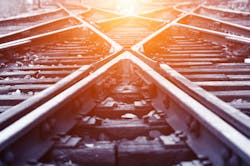TRANSIT: Study indicates Buy America rules are taking toll on transit
The American Action Forum (AAF) released research late last week that found “Buy America” rules for Federal Transit Administration (FTA) grants could be raising procurement costs in some areas.
By way of example, political site The Hill said that Washington D.C.’s beleaguered Metrorail system could have, according to the study, saved $700,000 on each of its 7000-series rail cars if it was able to purchase new cars at the price the cars cost overseas.
President Trump has repeatedly promised that his policies, including his as-yet unrealized infrastructure proposal, would require companies to buy and hire American-owned and –based products and services. Concern has arisen that AAF’s study could supply congressional opponents worried that Buy America rules would create an unfair system of winners and losers by denying federal funds for certain companies with some ammunition to go up against a strict American-first policy.
“The benefits of Buy America/American policies are likely overstated, and they are, at least partially, responsible for higher infrastructure costs,” the AAF report said. “When comparing the metro car procurement costs in the U.S. to notable foreign systems, the U.S. is clearly more expensive.”
Current federal requirements maintain that rolling stock, which includes buses, vans and railcars, must have at least 60% of its components sourced American. That percentage is set to increase to 70% by 2020 under a highway bill Congress passed in 2015.
The FTA can waive Buy America requirements if it is not in the public interest, the products are not available domestically or if it would cost at least 25% more than a foreign-made alternative. However, waivers for rolling stock are not generally issued by the FTA, because the 60% domestic content requirement is already considered a form of a waiver.
The AAF study claims that Buy America requirements are contributing to higher transit costs in the U.S., and questions whether the policy outweighs the economic costs.
The study also points out that Buy America doesn’t always benefit U.S. companies or workers, since oftentimes the contracted company is a subsidiary of a foreign company. Boston’s new metro cars, for example, will come from a subsidiary of CRRC, a Chinese-owned train manufacturer.
“Because the procurement process of metro cars in the U.S. tends to favor large procurements in a short amount of time, there are also startup costs baked into the contracts (since new manufacturing plants may need to be built), as well as baked in risk costs for the volatility of materials prices,” the study said.
